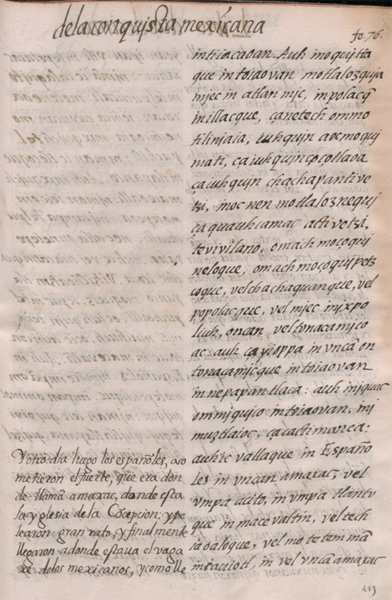Folio 76 recto
Translations and Transcriptions
Spanish Translation
[Translation of the Nahuatl into Spanish by Fr. Bernardino de Sahagún; transcription of the Spanish (left-hand column) by James Lockhart:] [f. 76r.] Y otro dia luego los españoles, acometieron el fuerte, que era donde llamā amaxac, donde esta la yglesia de la Cōcepcion: y pelearon gran rato, y finalmente llegaron adonde estaua el vagaxe de los mexicanos, y como lle
English Translation
[Translation of the Nahuatl (right-hand column) by James Lockhart:] When our enemies saw this, they tried to flee. Many died in the water, sinking and submerging, just pulling at each other, as though they had lost their senses and were fainting. They seemed to fall splattering; when they tried to flee they just fell between the logs. When they were dragged out they were completely covered with mud, slimy with mud, entirely drowned. A great many perished, there was a great abundance of deaths. This was the only time that the different [local] people who were our enemies died in great numbers there. And the day after our enemies had died, everything lay silent. And at this time the Spaniards came to Amaxac; they reached the very place where the common people lay in extremity. They fully surrounded us, and there was fierce battle, right in Amaxac [Translation of the Spanish (left-hand column) by James Lockhart:] Then the next day the Spaniards attacked the stronghold, at the place they call Amaxac, where the church of Concepción is, and they fought for a long while, until finally they reached the place where the Mexica's baggage was. When
Analytic Transcription
[Transcription of the Nahuatl (right-hand column) by James Lockhart:] [f. 76r.] in tiiacaoan. Auh in oquittaque in toiaovan motlalozquia miec in atlan mic, in polacq̄ in illacque, ça netech ommotiliniaia, iuhquin aocmo quimati, ça iuhquin çoçotlaoa ça iuhquin chachapantivetzi, in oc nen motlaloznequi ça quauhcamac activetzi, tevivilano, omach moçoquineloque, omach moçoquipetzcoque, vel chachaquanque, vel popolacque, vel miec in ixpoliuh, oncan vel tonacamicoac: auh çayioppa in vncā ontonacamicque in toiaovan in nepapan tlaca: auh in iquac ommiquico in toiaovan, in imuztlaioc, ça cactimanca: auh ic vallaque in Españoles in vncan amaxac, vel vmpa acito, in vmpa tlantoque in macevaltin, vel techiaoaloque, vel motetemmā in iauiotl, in vel vncā amaxac
Image

Spanish Translation
[Translation of the Nahuatl into Spanish by Fr. Bernardino de Sahagún; transcription of the Spanish (left-hand column) by James Lockhart:] [f. 76r.] Y otro dia luego los españoles, acometieron el fuerte, que era donde llamā amaxac, donde esta la yglesia de la Cōcepcion: y pelearon gran rato, y finalmente llegaron adonde estaua el vagaxe de los mexicanos, y como lle
English Translation
[Translation of the Nahuatl (right-hand column) by James Lockhart:] When our enemies saw this, they tried to flee. Many died in the water, sinking and submerging, just pulling at each other, as though they had lost their senses and were fainting. They seemed to fall splattering; when they tried to flee they just fell between the logs. When they were dragged out they were completely covered with mud, slimy with mud, entirely drowned. A great many perished, there was a great abundance of deaths. This was the only time that the different [local] people who were our enemies died in great numbers there. And the day after our enemies had died, everything lay silent. And at this time the Spaniards came to Amaxac; they reached the very place where the common people lay in extremity. They fully surrounded us, and there was fierce battle, right in Amaxac [Translation of the Spanish (left-hand column) by James Lockhart:] Then the next day the Spaniards attacked the stronghold, at the place they call Amaxac, where the church of Concepción is, and they fought for a long while, until finally they reached the place where the Mexica's baggage was. When
Analytic Transcription
[Transcription of the Nahuatl (right-hand column) by James Lockhart:] [f. 76r.] in tiiacaoan. Auh in oquittaque in toiaovan motlalozquia miec in atlan mic, in polacq̄ in illacque, ça netech ommotiliniaia, iuhquin aocmo quimati, ça iuhquin çoçotlaoa ça iuhquin chachapantivetzi, in oc nen motlaloznequi ça quauhcamac activetzi, tevivilano, omach moçoquineloque, omach moçoquipetzcoque, vel chachaquanque, vel popolacque, vel miec in ixpoliuh, oncan vel tonacamicoac: auh çayioppa in vncā ontonacamicque in toiaovan in nepapan tlaca: auh in iquac ommiquico in toiaovan, in imuztlaioc, ça cactimanca: auh ic vallaque in Españoles in vncan amaxac, vel vmpa acito, in vmpa tlantoque in macevaltin, vel techiaoaloque, vel motetemmā in iauiotl, in vel vncā amaxac
Image
